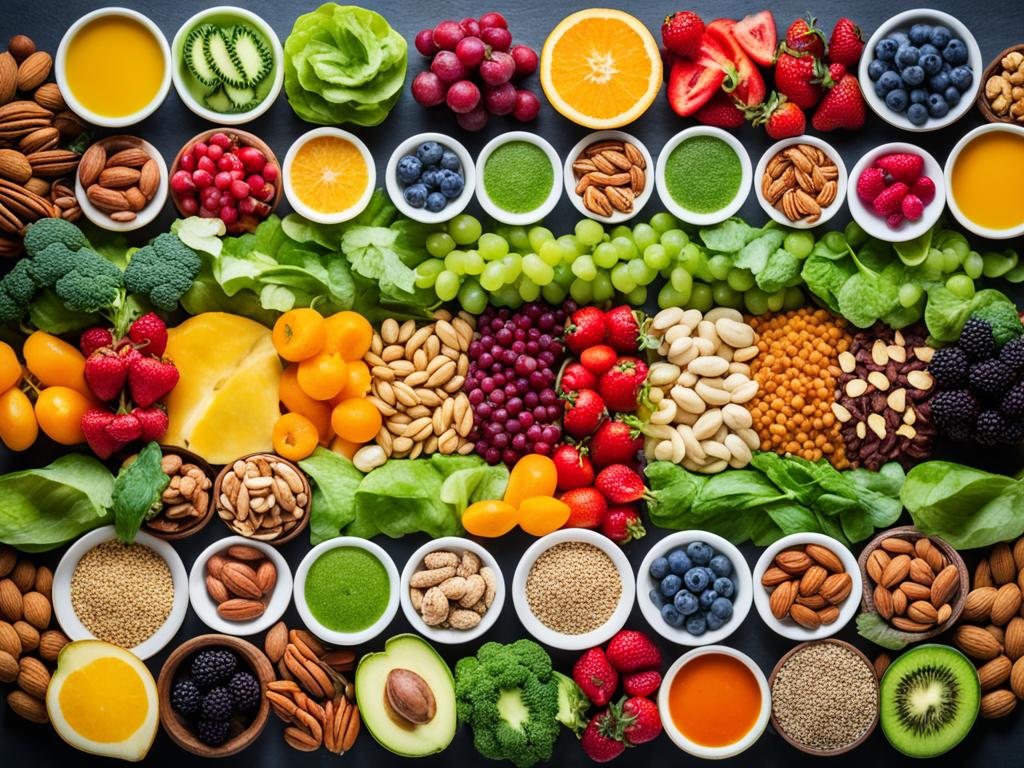Welcome to our beginner’s guide to plant-based diets, where we’ll explore the health benefits of adopting this lifestyle. Whether you want to improve your overall well-being, manage your weight, or reduce your carbon footprint, plant-based diets offer a sustainable and nourishing pathway to a healthier you.
Plant-based diets prioritize foods derived from plants, such as fruits, vegetables, whole grains, legumes, nuts, and seeds. By focusing on these natural and unprocessed foods, you can reap a multitude of health benefits while supporting a more sustainable food system.
Research suggests that plant-based diets can lower the risk of chronic diseases, including heart disease, type 2 diabetes, and certain types of cancer. They can also help maintain a healthy weight, improve digestion, and increase energy levels, among other positive effects.
Are you ready to embark on your plant-based journey? In the following sections, we’ll guide you through the ins and outs of plant-based diets, from understanding the nutrition behind them to providing step-by-step tips on getting started.
Key Takeaways:
- Plant-based diets prioritize foods derived from plants, such as fruits, vegetables, whole grains, legumes, nuts, and seeds.
- Research suggests plant-based diets can lower the risk of chronic diseases and improve overall well-being.
- Plant-based diets offer a sustainable and nourishing pathway to a healthier lifestyle.
- In the next sections, we will delve deeper into plant-based diets and provide practical tips on getting started.
Understanding Plant-Based Diets
When it comes to improving your health and well-being, plant-based diets have gained significant recognition. But what exactly do they entail? In this section, we will explore the ins and outs of plant-based diets, including their nutritional considerations and the remarkable health benefits they offer.
The Basics of Plant-Based Diets
A plant-based diet emphasizes the consumption of whole, unprocessed foods derived from plants such as fruits, vegetables, legumes, nuts, seeds, and whole grains. While there are various interpretations of plant-based diets, the common thread is the focus on incorporating predominantly plant-based foods into your meals.
Plant-based diets offer a plethora of nutritional benefits. Rich in fiber, vitamins, minerals, and antioxidants, they can provide essential nutrients while reducing the risk of chronic diseases like heart disease, obesity, and certain cancers. Additionally, plant-based diets often offer lower calorie and saturated fat content, promoting weight management and overall well-being.
Key Nutritional Considerations
When adopting a plant-based diet, it’s important to ensure you’re meeting your nutritional needs. While plants offer a wide range of nutrients, paying attention to certain key elements will help you maintain a balanced and healthy lifestyle.
“Plant-based diets can provide all the essential nutrients your body needs, but it’s crucial to plan your meals carefully and incorporate a variety of foods,” says Registered Dietitian Maria Smith. “Make sure to include sources of plant-based proteins, such as legumes, tofu, tempeh, and seeds, and prioritize foods rich in calcium, iron, vitamin B12, and omega-3 fatty acids.”
By being mindful of micronutrients like calcium, iron, and vitamin B12, you can ensure your body receives the necessary nourishment for optimal health. Fortified foods and supplements can play a role in meeting these specific requirements, and consulting with a healthcare professional or registered dietitian can offer personalized guidance.
Exploring the Benefits
Embracing a plant-based diet can yield remarkable health benefits. Studies have shown that plant-based diets are associated with a reduced risk of chronic diseases, including heart disease, hypertension, type 2 diabetes, and certain cancers. The high fiber content of plant-based diets can aid digestion, promote satiety, and support weight management.
Furthermore, plant-based diets are often rich in phytochemicals and antioxidants, which help combat oxidative stress and inflammation in the body. These powerful compounds have been linked to improved overall health and longevity.
Overall, by adopting a plant-based diet, you can nourish your body with a wide array of essential nutrients, promote better health outcomes, and contribute to a more sustainable future.
Getting Started with a Plant-Based Diet: A Step-by-Step Guide
If you’re looking to embrace a healthier lifestyle and reap the benefits of a plant-based diet, this step-by-step guide will help you get started on your journey. Transitioning to a plant-based diet may seem intimidating at first, but with the right approach and preparation, you can make the shift smoothly and enjoyably.
Step 1: Understanding the Basics
Before diving into a plant-based diet, it’s important to have a clear understanding of what it entails. A plant-based diet focuses on consuming whole, unprocessed foods derived from plants, such as fruits, vegetables, legumes, whole grains, nuts, and seeds. By minimizing or eliminating animal products, you can enjoy a diet that is rich in vitamins, minerals, antioxidants, and fiber.
Step 2: Meal Planning
Meal planning is an essential part of successfully adopting a plant-based diet. Plan your meals in advance to ensure you have a variety of nutritious options throughout the week. Consider incorporating different flavors, textures, and colors into your meals to keep them exciting and satisfying. Explore plant-based recipes online or invest in a plant-based cookbook for inspiration.
Step 3: Grocery Shopping
When grocery shopping for a plant-based diet, prioritize fresh produce, whole grains, beans, and legumes. Aim to fill your cart with a rainbow of colorful fruits and vegetables to ensure a wide range of nutrients. Don’t forget to stock up on pantry staples like nuts, seeds, spices, and plant-based dairy alternatives.
Step 4: Making Gradual Changes
Transitioning to a plant-based diet doesn’t have to be an overnight change. It’s often more sustainable and manageable to make gradual shifts. Begin by replacing one meal a day with a plant-based option, gradually increasing the number of plant-based meals as you become more comfortable and creative in the kitchen.
“The journey towards a plant-based diet is a personal one, so remember to be patient with yourself and enjoy the process.”
Step 5: Exploring New Ingredients
Embrace the opportunity to explore new ingredients and flavors in your plant-based meals. Experiment with different legumes, grains, and vegetables to discover new taste sensations. Consider replacing meat with plant-based proteins like tofu, tempeh, and seitan. Don’t be afraid to try new recipes and adapt them to suit your preferences.
Step 6: Seeking Support
Embarking on a plant-based diet can feel overwhelming at times, so it’s helpful to seek support from like-minded individuals. Join online forums, social media groups, or local meetup groups to connect with others who share your passion for plant-based living. Remember, you’re not alone on this journey!
Step 7: Monitoring Nutrient Intake
While a well-planned plant-based diet can provide all the essential nutrients your body needs, it’s important to monitor your nutrient intake, especially in the beginning. Pay attention to key nutrients like protein, iron, calcium, and vitamin B12. Consider consulting a registered dietitian to ensure you’re meeting your individual nutritional needs.
| Benefits of a Plant-Based Diet | Meal Planning Tips | Plant-Based Recipe Ideas |
|---|---|---|
| Improved heart health | Batch cook and freeze meals for convenience | Quinoa and black bean salad |
| Reduced risk of chronic diseases | Experiment with different spices and herbs | Chickpea curry with coconut milk |
| Weight management | Opt for whole grains over refined grains | Sweet potato and black bean enchiladas |
| Increased energy levels | Include a variety of fruits and vegetables in your meals | Mango and avocado salad with lime dressing |
Taking the first step towards a plant-based diet is an exciting and empowering choice. Remember to be patient with yourself as you navigate this new way of eating. Embrace the abundance of plant-based foods available and enjoy the positive impact it can have on your health and well-being.
Nutritional Considerations for Plant-Based Diets
When adopting a plant-based diet, it’s essential to be mindful of your nutritional considerations to ensure you meet your dietary needs and maintain optimal health. By understanding the potential nutrient deficiencies that can arise and making informed choices, you can confidently embrace the benefits of a plant-based lifestyle.
The Importance of Balanced Nutrition
Plant-based diets offer a wealth of health benefits, including reduced risk of chronic diseases and improved overall well-being. However, to fully reap these benefits, it’s crucial to pay attention to the nutrients your body requires.
Protein intake is one common concern for individuals following plant-based diets. While animal products are not included, plant-based foods such as legumes, tofu, tempeh, and seitan are excellent sources of protein. By incorporating a variety of these protein-rich foods into your meals, you can maintain adequate protein intake.
Another essential nutrient to consider is iron. Plant-based sources of iron include dark leafy greens, lentils, quinoa, and fortified cereals. To maximize iron absorption, pair these foods with vitamin C-rich options like citrus fruits, bell peppers, or tomatoes.
Calcium is vital for maintaining healthy bones and teeth. While dairy products are not consumed in plant-based diets, you can obtain calcium from sources such as fortified plant-based milk, tofu, tahini, and leafy green vegetables like kale and broccoli.
Addressing Nutrient Deficiencies
In some cases, nutrient deficiencies can arise when following a plant-based diet. However, with the right planning and food choices, it is entirely possible to meet your nutritional requirements.
Vitamin B12 is one nutrient of concern for individuals following plant-based diets. Since B12 is primarily found in animal-based products, it is recommended to include fortified plant-based milk, breakfast cereals, or take a B12 supplement to ensure adequate intake.
Omega-3 fatty acids, particularly EPA and DHA, can be challenging to obtain from plant-based sources alone. However, options such as flaxseeds, chia seeds, walnuts, and algae-based supplements can provide essential omega-3 fatty acids.
Consulting a Healthcare Professional
If you have specific concerns about meeting your nutritional needs on a plant-based diet, it’s always a good idea to consult a healthcare professional or registered dietitian. They can offer personalized guidance and ensure you are getting the nutrients your body requires.
With proper planning and attention to these nutritional considerations, a plant-based diet can provide all the essential nutrients needed for a healthy, balanced lifestyle.
The Environmental Impact of Plant-Based Eating
Adopting a plant-based diet goes beyond benefiting your own health—it also has a significant positive impact on the environment. By embracing plant-based eating, you contribute to sustainability efforts and help mitigate the environmental challenges we face today.
One of the key environmental benefits of plant-based eating is the reduction in greenhouse gas emissions. Livestock agriculture, particularly the production of meat and dairy products, is a major contributor to global greenhouse gas emissions. By transitioning to a plant-based diet, you can significantly decrease your carbon footprint and contribute to the fight against climate change. Plant-based foods typically require fewer resources and emit fewer greenhouse gases during production compared to animal-based products.
“The food system is responsible for more than a quarter of all greenhouse gas emissions. By promoting plant-based eating, we can address climate change and create a more sustainable future.”
In addition to reducing greenhouse gas emissions, plant-based eating also helps conserve resources. Animal agriculture requires vast amounts of land, water, and energy. By shifting towards plant-based alternatives, we can reduce the strain on these valuable resources. Plant-based diets have been found to be more water-efficient, requiring significantly less water compared to the production of animal-based foods.
A plant-based diet also supports a more sustainable food system. The demand for meat and animal products puts immense pressure on our natural resources, leading to deforestation, habitat destruction, and biodiversity loss. By choosing plant-based options, you can help preserve ecosystems and protect wildlife habitats.
Embracing plant-based eating has far-reaching environmental benefits, including reducing greenhouse gas emissions, conserving resources, and supporting a more sustainable food system. By making conscious choices about our dietary habits, we can play an active role in creating a healthier planet for current and future generations.
Environmental Impact Comparison
| Environmental Impact | Plant-Based Eating | Animal-Based Eating |
|---|---|---|
| Greenhouse Gas Emissions | Lower emissions due to less resource-intensive production | Higher emissions due to intensive livestock farming |
| Land Use | Requires less land for crop production | Requires extensive land for animal agriculture |
| Water Usage | More water-efficient | High water consumption in livestock farming |
| Resource Consumption | Requires fewer resources for production | High demand for land, water, and energy |
| Ecological Impact | Supports biodiversity preservation | Contributes to habitat destruction and biodiversity loss |
By analyzing the environmental impact of plant-based eating compared to animal-based eating, it’s clear that adopting a plant-centric diet is not only beneficial for your own well-being but also for the health of our planet. Let’s strive for a more sustainable future by incorporating more plant-based foods into our daily lives.
Delicious Plant-Based Meal Ideas
Looking for some inspiration to spice up your plant-based eating journey? We’ve got you covered! Discover a wide variety of delicious plant-based meal ideas that will tantalize your taste buds and keep you on the path to healthy eating.
1. Satisfying Breakfast Options:
Start your day off right with these hearty and nutritious plant-based breakfast recipes:
- Smoothie bowl topped with fresh fruits, nuts, and seeds
- Avocado toast on whole-grain bread with a sprinkle of nutritional yeast
- Vegan pancakes made with oat flour and topped with maple syrup and berries
2. Tasty Main Dishes:
Enjoy flavorful and filling plant-based main dishes that will leave you craving more:
- Roasted vegetable quinoa salad with a zesty lemon tahini dressing
- Mushroom and lentil burgers served on a whole-grain bun with avocado and lettuce
- Spaghetti squash with marinara sauce and vegan meatballs
3. Delectable Desserts:
Satisfy your sweet tooth with these delectable plant-based desserts:
- Raw vegan cheesecake made with cashews, dates, and berries
- Chocolate avocado mousse topped with coconut whipped cream
- Baked apples stuffed with cinnamon and walnuts
Remember, plant-based meals can be incredibly flavorful and satisfying. Don’t be afraid to experiment with different spices, herbs, and cooking techniques to enhance the taste of your dishes.
Check out the image below for a visual feast of the mouthwatering plant-based meal ideas:
With these scrumptious recipe ideas, you’ll never feel limited by plant-based eating. Embrace the flavors, textures, and nourishing goodness of these meals, and enjoy the journey towards a healthier, more vibrant you.
Conclusion
Throughout this article, we have explored the world of plant-based diets and the numerous health benefits they offer. By adopting a plant-based lifestyle, you can make a positive change towards a healthier and more sustainable way of living.
Plant-based diets are not only rich in essential nutrients, but they also have the potential to reduce the risk of chronic diseases, promote weight management, and improve overall well-being. By focusing on plant-based foods such as fruits, vegetables, whole grains, legumes, and nuts, you can nourish your body with the vitamins, minerals, and antioxidants it needs to thrive.
Embracing a plant-based lifestyle is more than just a diet; it is a holistic approach to wellness. By making mindful choices about what you eat, you are also contributing to the preservation of our planet’s resources and reducing the impact on the environment. You have the power to make a positive difference not only for your health but also for the world we live in.
So why not embark on this journey towards a healthier lifestyle? Start by incorporating more plant-based meals into your daily routine, trying out new recipes, and discovering the wonderful flavors and variety that plant-based eating has to offer. Your body and the planet will thank you for it. Here’s to a vibrant and fulfilling plant-based life!







